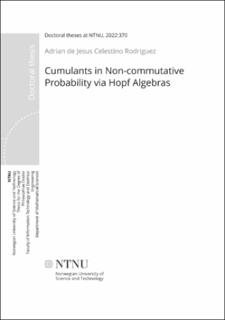Cumulants in Non-commutative:Probability via Hopf Algebras
Doctoral thesis
Permanent lenke
https://hdl.handle.net/11250/3032313Utgivelsesdato
2022Metadata
Vis full innførselSamlinger
Sammendrag
The notion of cumulants plays a significant role in the combinatorial study of noncommutative probability theory. In this thesis, we study several problems associated with the notions of cumulants for free, Boolean and monotone independence via a unified Hopf algebraic framework for non-commutative probability. In this framework, developed by Ebrahimi-Fard and Patras [EFP15, EFP16, EFP18], the relations between moments and the different brands of cumulants are described by three different exponentials that relate the group of characters and the Lie algebra of infinitesimal characters on a particular word Hopf algebra H.
The first question that we address is to show how the algebraic central limit theorems for free, Boolean and monotone independence enter into the shuffle-algebraic picture for non-commutative probability. We analyze how the different notions of additive convolutions are described in the shuffle framework and prove combinatorial formulas for the powers of the half-shuffle products.
Next, we focus on extending the shuffle framework in order to consider the extension of non-commutative probability called infinitesimal non-commutative probability. We show how infinitesimal cumulants also correspond to infinitesimal characters on H and describe the shuffle-algebraic equations for the infinitesimal moment-cumulant relations. We also prove that the combinatorial relations between infinitesimal cumulants follow via the extended shuffle-algebraic framework.
Afterwards, we concentrate on the problem of writing the multivariate monotone cumulants of random variables in terms of their moments. The starting point to obtain this formula is to compute a logarithm of a certain character on H. Then by investigating a connection of H with a Hopf algebra of decorated rooted trees, we compute the logarithm instead in the Hopf algebra of trees, which yields a new combinatorial formula from moments to monotone cumulants in terms of Schröder trees.
Thereafter, we turn to the problem, left open in [AHLV15], of expressing multivariate monotone cumulants in terms of the free and Boolean cumulants. Our approach relies on a pre-Lie algebraic relation between the three infinitesimal characters associated to the free, Boolean and monotone cumulants. This relation is known as the pre-Lie Magnus expansion and is defined in terms of iterations of a pre-Lie product. Our problem is then transformed into finding a combinatorial formula in terms of non-crossing partitions of the iterated pre-Lie products and identifying and describing the coefficients that govern the transition from free and Boolean to monotone cumulants.
The coefficients obtained in the solution of the previous problem hint at a deeper relation between non-commutative probability, combinatorics of rooted trees and free pre-Lie algebras. Our last question is to have a more systematic understanding of the previous relation. In the process, we develop a concrete and effective method of computations on a specific class of pre-Lie algebras, where iterations of the pre-Lie product can be computed in terms of forest formulas for iterated coproducts. We illustrate our method by retrieving the formulas between monotone and free (Boolean) cumulants, as well as the computation of the pre-Lie Magnus expansion on the generator of the free pre-Lie algebra of rooted trees.
